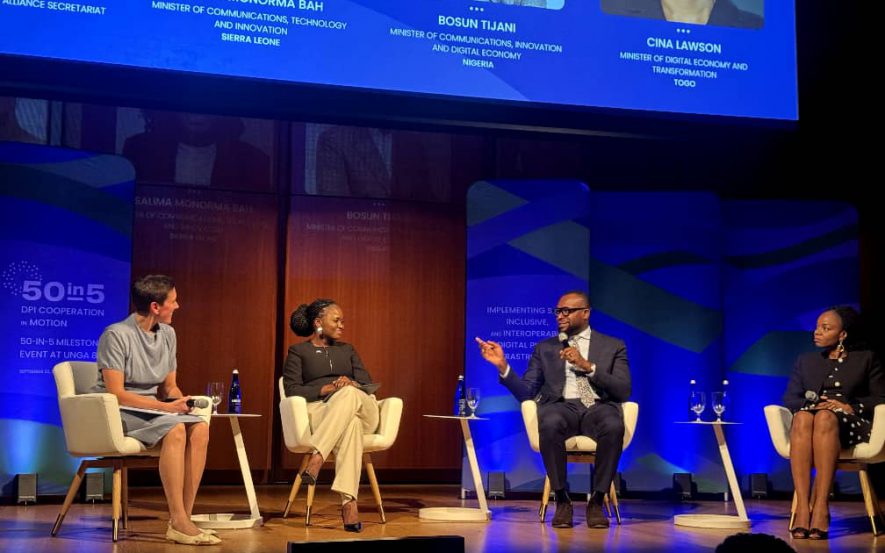Back to About Us > Nigeria Joins the Digital Public Goods Alliance

Nigeria has been named the newest member of the Digital Public Goods Alliance (DPGA), a multi-stakeholder UN-endorsed initiative that facilitates the discovery and deployment of open-source technologies, bringing together countries and organisations to create a thriving global ecosystem for digital public goods (DPGs) and helping to achieve the Sustainable Development Goals (SDGs).
Digital public goods are open technology solutions that countries can freely adopt to accelerate digital transformation, improve residents’ lives, and drive economic growth. Specifically, they are open-source software, open data, open AI systems, and open content collections that adhere to privacy and other applicable best practices, do no harm, and are of high relevance for attainment of the United Nations 2030 SDGs.
“Nigeria’s membership of the Digital Public Goods Alliance reinforces our commitment to building an open, inclusive, and collaborative digital ecosystem that empowers our people and drives sustainable growth,” said Dr. ‘Bosun Tijani, Minister of Communications, Innovation & Digital Economy. “As we strengthen our digital public infrastructure, the adoption of digital public goods ensures that innovation within government is transparent, interoperable, and globally connected.
“Through this partnership, Nigeria is not only participating in a global movement, but also contributing homegrown solutions that reflect our leadership in shaping the future of digital transformation in Africa.”
Through joining the DPGA, Nigeria confirms its commitment to integrate digital public goods into its government digital services stack by fostering a supportive policy environment and promoting effective public-private partnerships to embed DPGs as a core element of its digital public infrastructure. Guided by Nigeria’s DPI Framework, which recognises DPGs as essential for diversity, openness, and innovation, the country’s activities include developing a national playbook with clear policies, guidelines, and frameworks to standardise and scale the adoption of DPGs like OpenCRVS for civil registration, DHIS2 for health information systems, and KoboToolbox for data collection, across Nigerian government agencies and states.
Nigeria aims to build local capacity for digital public goods through the 3MTT and DevsInGovernment programs to aid continuous development and maintenance of DPGs, thus making more Nigerian digital solutions compliant with the DPG Standard and as such reusable within and across borders. Among the planned national DPG nominations are some solutions from eHealth Nigeria, which already leverages a digital public good, OpenMRS, to digitise health data in the north of the country; BudgIT, a civic tech organisation advancing transparency in government spending; and Citizens’ Gavel, which uses digital platforms to expand access to justice.
“By embracing digital public goods in its policy processes and capacity building efforts, Nigeria is strengthening its own digital public infrastructure and service delivery in vital areas such as education and health, and also demonstrating global leadership in driving inclusive and sustainable digital transformation,” shared Liv Marte Nordhaug, Chief Executive Officer of the Digital Public Goods Alliance Secretariat.
The announcement happened during the DPI Cooperation in Motion 50-in-5 Milestone Event, held on the sidelines of the 80th United Nations General Assembly (UNGA80) in New York City on September 22, 2025. By joining the DPGA, Nigeria will contribute to and benefit from shared insights, best practices, and innovations regarding digital transformation that is inclusive and beneficial for all citizens.
“Nigeria’s membership of the Digital Public Goods Alliance reinforces our commitment to building an open, inclusive, and collaborative digital ecosystem that empowers our people and drives sustainable growth,” said Dr. ‘Bosun Tijani, Minister of Communications, Innovation & Digital Economy. “As we strengthen our digital public infrastructure, the adoption of digital public goods ensures that innovation within government is transparent, interoperable, and globally connected.
“Through this partnership, Nigeria is not only participating in a global movement, but also contributing homegrown solutions that reflect our leadership in shaping the future of digital transformation in Africa.”

Federal Secretariat Complex Phase I,
Annex III, Shehu Shagari Way,
FCT Nigeria.
P.M.B. 12578
© FMCIDE 2025, All rights reserved.
Kindly fill out the below and we shall keep in touch with you.
Error: Contact form not found.